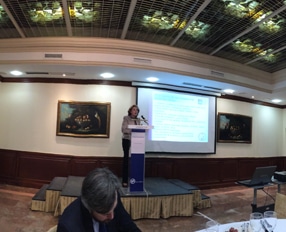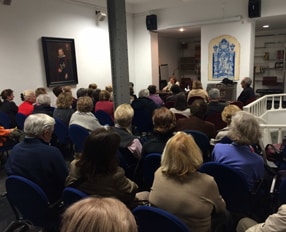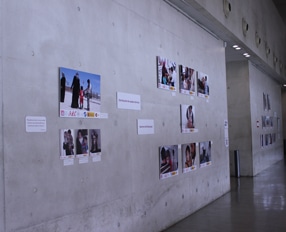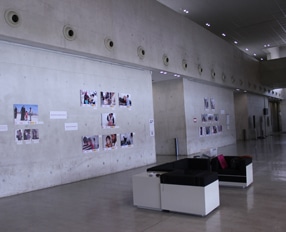The President of the Foundation for the Social Promotion of Culture and member of the Executive Board of the CEMOFPSC, Jumana Trad, gave two conferences during the last couple of weeks in order to help people to understand the Arab world, Christians and minorities’ situation and show the work that FPSC is carrying out in the Middle East region.
 She was invited as a speaker in the dinner-talk that took place last April the 9th in the Velázquez Hotel in Madrid. The debate was called “Society and Living Together in the Arab Countries” and it was organized by the Opinion Forum Jorge Juan.
She was invited as a speaker in the dinner-talk that took place last April the 9th in the Velázquez Hotel in Madrid. The debate was called “Society and Living Together in the Arab Countries” and it was organized by the Opinion Forum Jorge Juan.
Moreover, the 10th of April Jumana Trad was invited again to give a speech on “Arab World and Christians’ Situation” in the auditorium Real Oratorio de Caballero de Gracia.
Both events were crowded, so there weren’t available seats.
In these conferences, the President of the FPSC made clear that Christians are not upstarts in the region, because they live there since the origins of Christianism. Muslims came afterwards: from the VII Century with Muhammad.
She gave some relevant data, for example that the first seven Ecumenical Councils took place in the Middle East and that the first printing press that printed in Arabic, thanks to a monk, is in Lebanon. These pieces of information give us an idea of how important Christians were in the Middle East for History.
For centuries Christians directly contributed to cultural and social development in these countries.
 In Muslim countries it is difficult to separate religion and politics: the Islam is the religion of the State. Because of this bond, the situation has never been easy for Christians since the Islam expansion.
In Muslim countries it is difficult to separate religion and politics: the Islam is the religion of the State. Because of this bond, the situation has never been easy for Christians since the Islam expansion.
She analyzed the current situation of Christians, clearly getting worse, so in the 90’s there were 1,300,000 Christians in Iraq and now there are less than 200,000 and almost none of them in its mother town. A lot of them were sheltered in a typical Christian region, between Mosul and the Nínive valley, but in the last months the Islamic State has thrown them away from this shelter without its belongings, nor identity cards, and carrying the dramatic load of having members of their families killed or hijacked.
However, Jumana Trad sounded hopeful. Armenia was close to disappear, but today it is a free country. In 1860 there was an important religious chase in Lebanon, but for years it has been a country with freedom of religion, the only one in the Arab world.

On the other hand, from the 9th of April until the 23rd the FPSC exhibition “Humanitarian Crisis in the Middle East in Pictures: Disability in the Foreground” has been opened in the Communication Department of the Navarra University. This exhibition shows in 50 photographs the work of The Foundation for the Social Promotion of Culture in refugee camps together with other associations in the Middle East, mainly working for people with disabilities.
The exhibition was well accepted among the students, and it had a lot of visibility thanks to its strategic placement.

Check this link* if you want to know the opinion of Pep, student of the University of Navarra and volunteer for FPSC in a cooperation campaign in Jordan last summer, about the exhibition.
*Link in Spanish

